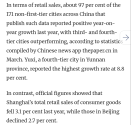Even in the 1800s, deflation was not necessarily bad for the economy.
. This prolonged period of persistent deflation is exactly when the US grew from an relative economic backwater to become the most dominant industrial power in the world.
Starting points matter, from 1866 to 1893, the U.S. government had budget surpluses each year and slashed the national debt to $961 million. China's augmented fiscal deficit is approximately ~12% of GDP - meaning deleveraging is impossible unless nominal GDP growth is faster than debt growth.
What this all means is that the 3 Red Lines have basically nuked the income of everybody involved in financial consulting or fund management of any kind, and with that the hiring levels of firms in those sectors. I am certain @abenomics12345 can corroborate this point.
While the dumbasses at Bloomberg recently wrote that article talking about how a family in Beijing making 300k USD has been severely impacted, this is the biggest of red herrings. Yes they'll have to give up eating at 新荣记 but whatevs. They might be down a bit on their equity of their homes but they will land on their feet.
Instead,
the people most impacted by the real estate downturn are actually the households in Tier 3-5 cities who bought homes in 2017-onwards. They'd be lucky to have any positive equity if they borrowed against that property. These people also tend to be migrant workers working in bigger cities (your Didi drivers/massage therapists/delivery workers/manufacturing line workers etc) who are suffering a double whammy - having to work harder to earn the same (involution) as a result of reduced consumption by the upper middle class in top tier cities.
It is important not to brush off the impact of the real estate crisis to the lower middle class - Bloomberg reporters are idiots, let's not fall to their levels.
Blaming intense competition for China's current bout of deflation is like blaming a plane crash on gravity.
The issue is not competition but involution - the success of Chinese industrial policy is not picking winners - the idea is to offer subsidies/tax incentives to 'jolt-start' the industry by inviting everyone (foreign and domestic) and let them compete and allow the market to pick winners - but more importantly, let the losers die off. An important part of this process is to regulate excessive local government subsidies - i.e not let local governments protect their local companies who are not viable entities without said subsidies.
Keep in mind, R&D investments are generally expensed on the income statement - its awfully difficult for companies to continue investing in R&D at the current pace if they cannot make a positive profit to recoup their expenses. There is a nuance between competition with scale effect and involution without end in sight.
Looking at the economic data (
), Manufacturing Investments are only growing at 2.7% -
this is the anti-involution process working as intended. Demand growth currently is 4-5% so supply growth (manufacturing investments) cannot be faster otherwise prices will continue falling. PPI will eventually turn positive once supply/demand balances out - with positive inflation an expected outcome eventually (for the deflation-is-good enthusiasts, please don't cope too hard when this happens)
As another example, for all the BYD fanboys - BYD's 'profitability' is in many ways at the expense of its suppliers who have to sign up for extremely punitive payment terms via the infamous Di-lian with significant discounts. What you call scale effect, I call bullying suppliers excessively. By the way this is why Shenzhen Inovance refused to supply BYD on its electric motors. As an aside, Di-lian has been colloquially referred to as the biggest illegal financing network since Evergrande by some in the industry.
This is also why the NDRC pushed for 60 day maximum Account Payable terms and why BYD's free cashflow is negative this year - they've had to payback all the A/P. That BYD shows good profitability does not mean that it is sustainable for the entire automotive ecosystem - which employs far more people than BYD does and is far more economically important.
Deflation is the end result of the problems with involution, fixing involution will solve deflation. As I've made the point countless times before, disinflation =/= deflation. Do not conflate the two concepts.
Required Reading for those who aren't up to date with the latest on Unified National Market and Anti-Involution:
P.S - if people are not understanding this correctly they've abysmally failed to understand the Two Upholds and Two Establishes, and if they don't know what this means, then they're NGMI.



